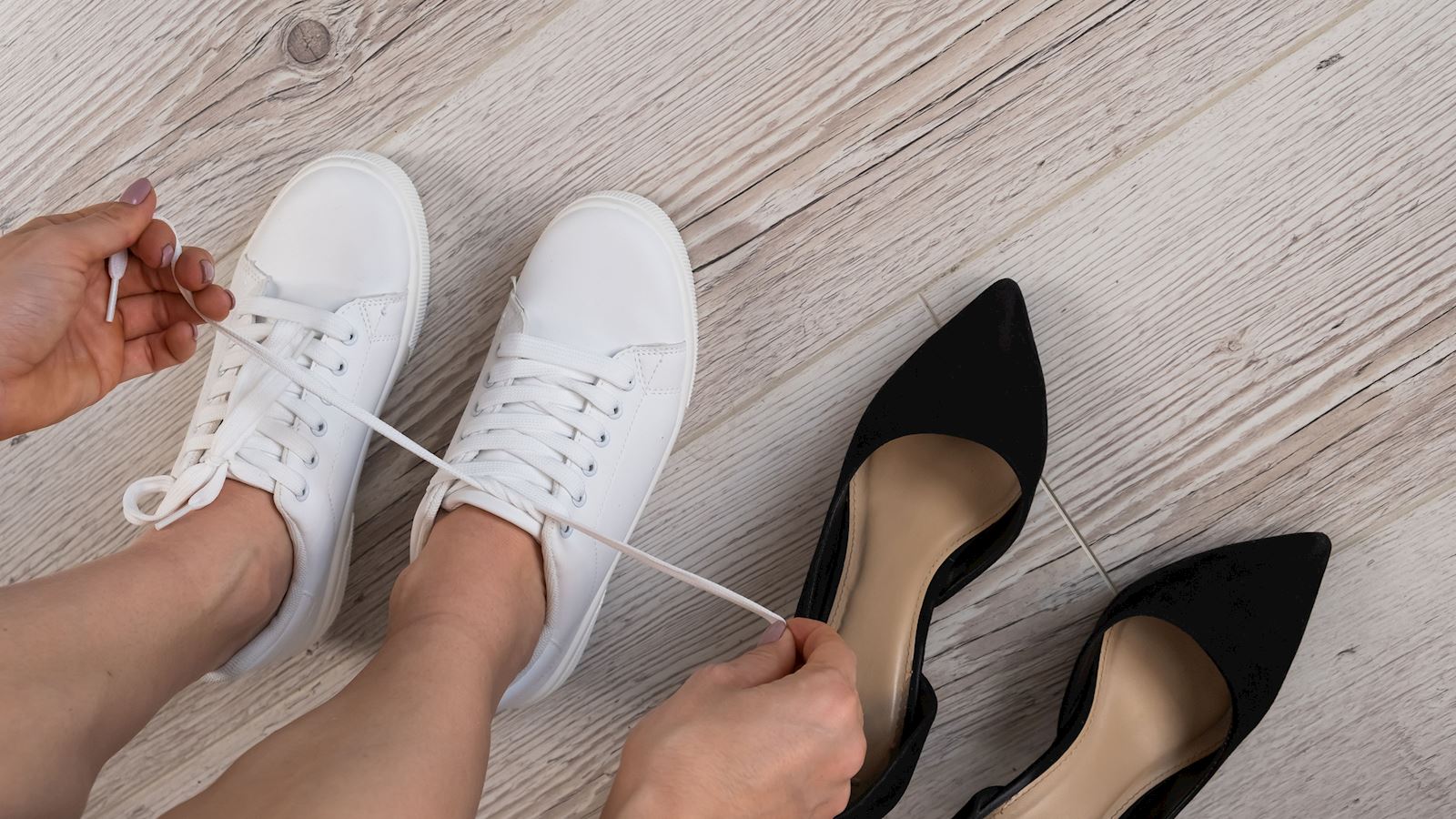The right pair of shoes does more than complete an outfit – it protects your feet, supports your joints, and helps prevent injuries. Whether you’re working a physically demanding job, heading to the gym, or just running errands, your shoes should match your lifestyle. Dr. Alivia Passet, a foot and ankle surgeon at The Iowa Clinic, weighs in on what to look for in your everyday footwear.
Why The Right Footwear Matters
Your feet are the foundation of your body. When they’re not properly supported, the impact is felt far beyond your toes. Wearing the wrong shoes – even for a short time – can lead to pain in your heels, arches, ankles, knees, hips, and even your lower back.
Footwear affects posture, gait, balance, and joint alignment. Over time, poorly constructed or ill-fitting shoes can contribute to chronic issues like bunions, tendonitis, and plantar fasciitis.
“The best shoe is the one that supports your activity level and your unique foot structure,” says Dr. Passet. “It’s not always about the brand or style – it’s about proper support, fit, and function.”
For the Everyday Walker
If your daily routine includes a lot of time on your feet – whether walking the dog, commuting, or staying active – you’ll want a supportive walking shoe that cushions your step and reduces fatigue.
Look for shoes with:
- Cushioned soles to absorb shock
- Proper arch support that matches your foot type
- A wide toe box to prevent pressure on the toes
- Breathable materials to keep feet cool and dry
Avoid thin-soled sneakers or trendy slip-ons that lack support. These can contribute to heel pain or stress on your knees and lower back over time.
For the Gym Enthusiast
Not all athletic shoes are created equal. The best shoe for running is very different from the best shoe for weightlifting or pilates class. Wearing the wrong type can impact your performance – and increase your risk of injury.
When looking for active lifestyle shoes, consider shoes that offer:
- Stability for lateral movements
- Shock absorption for high-impact exercises
- Activity-specific support
- Lightweight and breathable construction
Avoid using one pair for everything. Instead, rotate between shoes depending on your workout type to prevent overuse injuries.
For Healthcare and Service Workers
When you’re standing or walking for 8 to 12 hours a day, you need more than just comfort – you need consistent support to avoid fatigue and injury.
The best shoes for long shifts include:
- Slip-resistant shoes for workplace safety
- Arch support and heel cushioning to reduce strain
- Shock-absorbing midsoles for impact protection
- Durable, easy-to-clean materials
Shoes that are too flat or too flexible – like basic slip-ons or worn-out sneakers – can lead to problems like shin splints or joint pain over time.
For Dress or Office Wear
Just because a shoe looks good, doesn’t mean it feels good or is good for your body. If you’re wearing dress shoes daily, pay attention to features that support all-day comfort.
Choose shoes with:
- Low to moderate heels (2 inches or less)
- Wider heel bases like wedges or block heels for better balance
- Cushioned insoles to reduce pressure on the ball of the foot
- Flexible uppers that move with your foot
Avoid narrow toe boxes or high stilettos worn for long periods of time. They can cause or worsen bunions, hammertoes, and arch pain.
For Outdoor Adventures
If your lifestyle includes hiking, trail walking, or exploring nature, durability and traction are essential. Regular sneakers usually won’t cut it once the terrain gets uneven.
The right outdoor shoes offer:
- Thick, lugged soles for grip on rocks and trails
- Ankle support to reduce sprains
- Weather-resistant materials for wet or rugged environments
- A secure but roomy fit for long wear
Avoid worn-out trail shoes or using regular running shoes on rugged terrain – they won’t offer the stability or protection needed.
Step into better foot health.
If you’re dealing with chronic foot pain, heel pain, or recurring issues like bunions or flat feet, it’s worth seeing a specialist. A foot and ankle physician can help identify the cause of discomfort and recommend footwear or custom orthotics that support your specific needs. Schedule a consultation with a foot and ankle specialist today.


